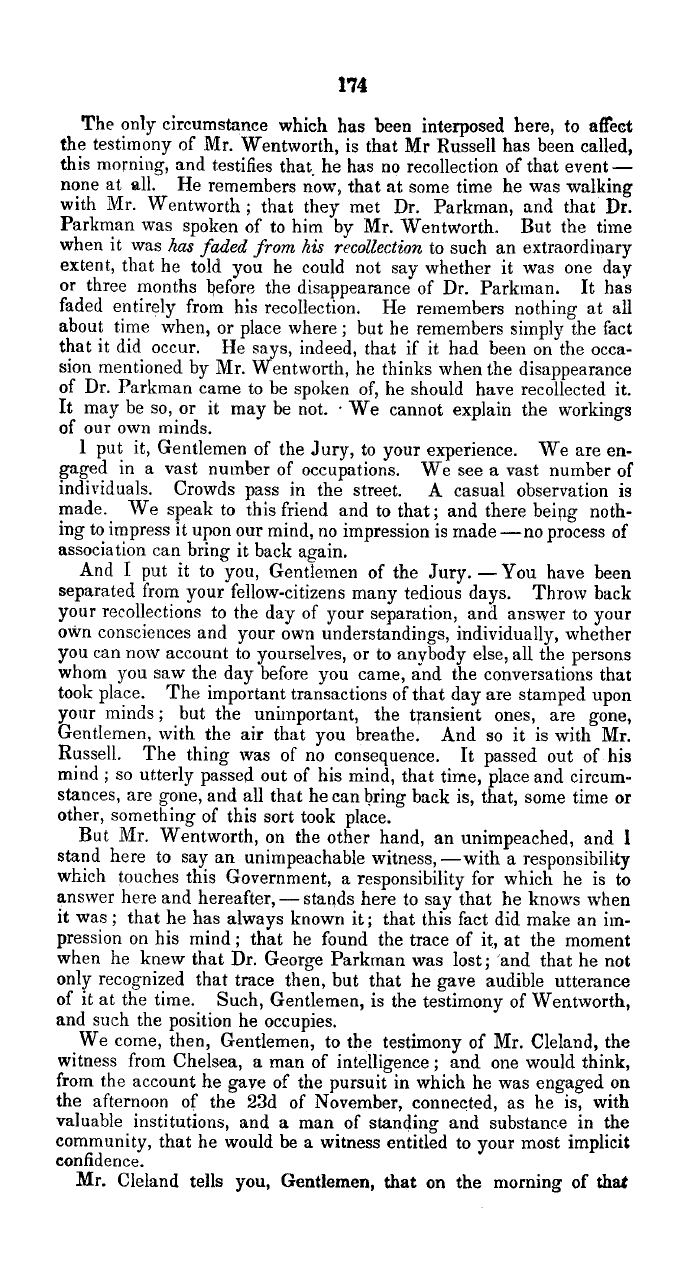|
174
The only circumstance which has been interposed here, to affect
the testimony of Mr. Wentworth, is that Mr Russell has been called,
this morning, and testifies that. he has no recollection of that event-
none at all. He remembers now, that at some time he was walking
with Mr. Wentworth; that they met Dr. Parkman, and that Dr.
Parkman was spoken of to him by Mr. Wentworth. But the time
when it was has faded from his recollection to such an extraordinary
extent, that he told you he could not say whether it was one day
or three months before the disappearance of Dr. Parkman. It has
faded entirely from his recollection. He remembers nothing at all
about time when, or place where; but he remembers simply the fact
that it did occur. He says, indeed, that if it had been on the occa-
sion mentioned by Mr. Wentworth, he thinks when the disappearance
of Dr. Parkman came to be spoken of, he should have recollected it.
It may be so, or it may be not. - We cannot explain the workings
of our own minds.
I put it, Gentlemen of the Jury, to your experience. We are en-
gaged in a vast number of occupations. We see a vast number of
individuals. Crowds pass in the street. A casual observation is
made. We speak to this friend and to that; and there being noth-
ing to impress it upon our mind, no impression is made -no process of
association can bring it back again.
And I put it to you, Gentlemen of the Jury. -You have been
separated from your fellow-citizens many tedious days. Throw back
your recollections to the day of your separation, and answer to your
own consciences and your own understandings, individually, whether
you can now account to yourselves, or to anybody else, all the persons
whom you saw the day before you came, and the conversations that
took place. The important transactions of that day are stamped upon
your minds; but the unimportant, the transient ones, are gone,
Gentlemen with the air that you breathe. And so it is with Mr.
Russell. The thing was of no consequence. It passed out of his
mind ; so utterly passed out of his mind, that time, place and circum-
stances, are gone, and all that he can bring back is, that, some time or
other, something of this sort took place.
But Mr. Wentworth, on the other hand, an unimpeached, and 1
stand here to say an unimpeachable witness,-with a responsibility
which touches this Government, a responsibility for which he is to
answer here and hereafter, - stands here to say that he knows when
it was; that he has always known it; that this fact did make an im-
pression on his mind; that he found the trace of it, at the moment
when he knew that Dr. George Parkman was lost; 'and that he not
only recognized that trace then, but that he gave audible utterance
of it at the time. Such, Gentlemen, is the testimony of Wentworth,
and such the position he occupies.
We come, then, Gentlemen, to the testimony of Mr. Cleland, the
witness from Chelsea, a man of intelligence; and one would think,
from the account he gave of the pursuit in which he was engaged on
the afternoon of the 23d of November, connected, as he is, with
valuable institutions, and a man of standing and substance in the
community, that he would be a witness entitled to your most implicit
confidence.
Mr. Cleland tells you, Gentlemen, that on the morning of that
|

